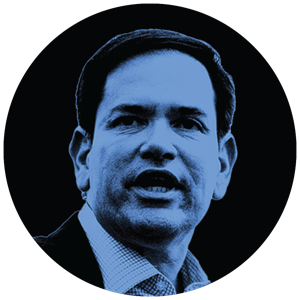ARTICLE AD BOX
Illustrations by Ben Hickey
In the summer of 2015, back when he was still talking to traitorous reporters like me, I spent extended stretches with Donald Trump. He was in the early phase of his first campaign for president, though he had quickly made himself the inescapable figure of that race—as he would in pretty much every Republican contest since. We would hop around his various clubs, buildings, holding rooms, limos, planes, golf carts, and mob scenes, Trump disgorging his usual bluster, slander, flattery, and obvious lies. The diatribes were exhausting and disjointed.
But I was struck by one theme that Trump kept pounding on over and over: that he was used to dealing with “brutal, vicious killers”—by which he meant his fellow ruthless operators in showbiz, real estate, casinos, and other big-boy industries. In contrast, he told me, politicians are saps and weaklings.
“I will roll over them,” he boasted, referring to the flaccid field of Republican challengers he was about to debate at the Ronald Reagan Presidential Library that September. They were “puppets,” “not strong people.” He welcomed their contempt, he told me, because that would make his turning them into supplicants all the more humiliating.
“They might speak badly about me now, but they won’t later,” Trump said. They like to say they are “public servants,” he added, his voice dripping with derision at the word servant. But they would eventually submit to him and fear him. They would “evolve,” as they say in politics. “It will be very easy; I can make them evolve,” Trump told me. “They will evolve.”
Like most people who’d been around politics for a while, I was dubious. And wrong. They evolved.
[J. D. Vance: Donald Trump is an opioid for the masses]
“I’ve never seen anything like it,” Trump told me the following spring, as he was completing his romp to the 2016 nomination. We were talking on the phone, and Trump had just wrapped up a rally in Anaheim, California. Former Texas Governor Rick Perry had recently endorsed him, despite dismissing Trump earlier as a “cancer on conservatism” and “a barking carnival act.”
“He made a statement saying something like I’m ‘the smartest guy ever to run for office,’ ” Trump told me (Perry didn’t say exactly that, but close). “How do you get from ‘cancer on the party’ to that? I get it, I get it; it’s how politicians are. But I couldn’t do that.”
Trump accepted Perry’s support, and then promptly taunted him. “He was going [around] saying the worst things about me!” Trump said at the Anaheim rally. “I have never seen people able to pivot like politicians.”
“It’s happening with all of them,” Trump said. “Lindsey Graham just called and was very nice … even though he used to say the worst things.” (Graham had called Trump, among other not-nice things, “a race-baiting, xenophobic religious bigot” and “a kook.”) Soon enough, the last holdouts would come around too. “It’s just so easy, how they do that,” Trump said.
As went individual Republican politicians, so went the party. Reince Priebus, the chair of the Republican National Committee in 2016, would become frustrated with Trump over his obvious scorn for his organization. Still, Priebus would gamely try to assure me that the GOP was shaped not by one man but rather by a set of traditions, principles, and conservative ideals. “The party defines the party,” Priebus kept telling me.
After Trump won the nomination in 2016, “The party defines the party” became a familiar feckless refrain among the GOP’s putative leaders. House Speaker Paul Ryan vowed to me that he would “protect conservatism from being disfigured.” Senate Majority Leader Mitch McConnell told the radio host Hugh Hewitt that “Trump is not going to change the institution,” referring to the GOP. “He’s not going to change the basic philosophy of the party.”
In retrospect, this was hilarious.
By the second night of the 2024 Republican National Convention at Milwaukee’s Fiserv Forum in July, some attendees had started showing up with a gauze pad slapped over their right ears, a tribute to the boxy white dressing Trump wore to cover the injury he’d suffered in an attempt on his life in Pennsylvania just days earlier.
The near miss had cast a peculiar aura over Trump’s jubilee in Milwaukee. For one thing, the bloodshed reaffirmed the popular Republican notion that Trump is a uniquely marked and defiant figure, as reflected by the T-shirts being sold depicting the wounded nominee raising his fist (as well as the still-fashionable mug-shot merchandise). But I spoke with several convention-goers who appeared stunned into a heightened sense of vulnerability by the event: Trump’s physical vulnerability, yes, but perhaps something shared as well. One could view the ear bandages in the crowd as a communal gesture of humanity, or even empathy.
[From the January/February 2024 issue: Trump voters are America too]
Whatever was behind them, the ear accessories quickly spread through the crowd and became ubiquitous. In a sense, the entire Republican Party has become an accessory. To no one’s surprise, everything in Milwaukee revolved around its unavoidable protagonist, “our 45th and soon-to-be 47th president, Donald J. Trump.”
On the first night of the convention, Trump made what would become his familiar WWE-style entrance. His head filled the big screen as the Republicans’ official cantor, Lee “God Bless the U.S.A.” Greenwood, provided the walk-up sermon. “Prayer works,” Greenwood called out as Trump stood in the wings. And God ensured, “as Donald Trump turned his head just slightly, that the bullet missed him just enough.” Trump was then seen on-screen doing a quick twirl of his finger, the universal gesture for Let’s get on with this.
“We have believed for so long that God will make some changes in this country,” Greenwood continued. (This was a few days before the other party’s God, Joe Biden’s “Lord Almighty,” would finally get through the White House switchboard.) Greenwood persisted in bestowing his blessings until Trump could wait no longer and began his slow walk onto the convention floor.
The roar was colossal. Trump waved and clapped for himself. Everyone he passed stepped back in reflexive obedience, or awe. I’d been watching Trump’s adulators work the arena all week, trying to outdo one another. “My fellow Americans,” Senator Marco Rubio said from the podium while Trump—his Audience of One—squinted up at him like a building inspector. As with many other brand-name Republicans in the arena, Rubio had once despised Trump. He ran against him for president in 2016. It got ornery. Rubio implied that Trump had a small penis; Trump derided Rubio as “Liddle Marco” and called him “weak like a baby.” That last assessment held up well.
“The only way to make America wealthy and safe and strong again is to make Donald J. Trump our president again,” Rubio declaimed from the podium. Trump nodded along from his center box, radiating pride of ownership—Liddle Marco had grown up so beautifully.
 Ben Hickey
Ben Hickey
Not all that long ago, Rubio had told me that “we should not have cults of personality” in the U.S. His parents and grandparents had fled dictatorship in Cuba. Their journey made him appreciate the gift of freedom and the danger of strongmen.
I talked a lot with Rubio in the last days of the 2016 primary, back when he was happy to speak candidly about Trump, and about how he knew better than to entrust the leadership of the United States to a “fraud,” “lunatic,” and “con artist” with autocratic instincts. And they all knew better—the Rubios, the Ted Cruzes, the J. D. Vances, the Doug Burgums, the Nikki Haleys, the Mitch McConnells, the Vivek Ramaswamys, all of them. They probably still know better. But they are all expedient, to their political core. “If you don’t want to get reelected,” Graham once told me, “you’re in the wrong business.”
For years, many had predicted a reckoning, a shared realization that the noisy, grievance-packed redoubt that the GOP had become—marked by servile devotion to one man—was perhaps not aligned with the party’s best traditions of rugged, free-thinking individualists. “Anytime a leader builds an entire movement around himself, it almost always leads to disaster,” Rubio had told me.
After so many party defections, electoral defeats, and broken spirits, surely some Republican self-correction was inevitable. But although there have been flashes, they haven’t lasted. I’ve heard all the private doubts about Trump from his most public of validators. These private doubts were once very public. “Mark my words, there will be prominent people in American politics who will spend years explaining to people how they fell into this,” Rubio told The New York Times in 2016, right before he “fell into this” himself.
“I don’t think so,” Doug Burgum, the North Dakota governor, said during his Republican-primary campaign last year, when asked whether he would ever do business with Trump. “I just think it’s important that you’re judged by the company you keep.” Within a few months, however, Burgum would be eager to tell everyone what regular company he was keeping with Trump. “It’s been a real honor for Kathryn and I to have spent as much time with the president as we have,” Burgum said in June as he was auditioning to be Trump’s running mate.
I’d thought that maybe 2024 would be the year the GOP finally began some semblance of a post-Trump future. At the very least, new voices of resistance had to finally assert themselves.
“I feel no need to kiss the ring,” Nikki Haley, Trump’s most competitive primary challenger in 2024, had vowed in February. Haley even made what passed for a subversive remark in her convention speech, when she said that not everyone agrees with Trump all of the time. “That’s their problem,” someone yelled out from the crowd.
But the ring, it would be kissed. “Donald Trump has my strong endorsement, period,” Haley said.
I ran into former Arkansas Governor Asa Hutchinson on the arena concourse. He was one of the only Republican-primary challengers who dared question Trump’s worldview. His campaign had gone nowhere, but Hutchinson held relatively firm. “I’m troubled,” Hutchinson told me. “I don’t want our party to be defined by attacks on our judiciary system. I don’t want it to be defined by anger.”
Hutchinson had previously distinguished himself as one of the few Republicans to have held elected office who said he would not vote for Trump. “I’ve made some commitments about not voting for a convicted felon,” Hutchinson conceded to ABC News later at the convention. Then he softened his position. “But that seems like a long time ago.”
Also a long time ago: the 2016 Republican convention in Cleveland, where Ted Cruz had delivered his plucky “vote your conscience” speech in defiance of Trump, whom Cruz had called “utterly amoral” and “a sniveling coward.”
“God Bless Donald J. Trump” is how Cruz’s speech in Milwaukee began. “Let me start by giving thanks to God Almighty for protecting President Trump,” he said, while the bandaged Almighty himself preened up at the sniveling coward onstage, who would follow him anywhere.
Biden’s defeat of Trump in 2020 had seemed certain to weaken Trump’s grip on the Republican Party, if not end his political career. No relevant precedent existed for any one-term president to become his party’s default front-runner in the next election. Especially not an extremely unpopular one-term president who lost by 7 million votes, refused to concede, incited a lethal insurrection in an attempt to overturn the result, was impeached for a second time, defied long-honored tradition by skipping the swearing-in of his successor, left behind a traumatized nation (with 25,000 National Guard troops defending the capital against his own supporters), became the first former president to be indicted … and the rest of the whole loser litany.
 LINDSEY GRAHAM
LINDSEY GRAHAM2015: “You know how to make America great again? Tell Donald Trump to go to hell”; “he is a race-baiting, xenophobic religious bigot.”
2016: “If we nominate Trump, we will get destroyed … and we will deserve it.”
2024 [To Trump]: “I love you.”
(Kent Nishimura / Getty)
 TIM SCOTT
TIM SCOTT2016: “If Donald Trump can’t take a stand against the KKK, we cannot trust him to stand up for America against Putin, Iran, or ISIS.”
2024 [To Trump]: “I just love you.”
(Eva Marie Uzcategui / Bloomberg / Getty)
Yet the speed with which Trump has settled back into easy dominance of his party has been both remarkable and entirely foreseeable—foreseen, in fact, by Trump himself. Because if there’s been one recurring lesson of the Trump-era GOP, it’s this: Never underestimate the durability of a demagogue with a captive base, a desperate will to keep going, and—perhaps most of all—a feeble and terrified opposition of spineless ciphers (“weak like a baby”).
“You know what I liked about Trump?” Lindsey Graham asked, waxing nostalgic about the former president—and yearning for his return—during a speech in Nashville in 2022. “Everyone was afraid of him. Including me.” It was a killer line, Graham in his amiable-mascot mode. It would also suffice as a preview of the 2024 Republican presidential primaries. “Resistance” to Trump, lame as it was, had become an inside joke among the party faithful.
Trump’s last remaining primary challenger, Haley, quit the race on March 6. That same day, Mitch McConnell—who had criticized the then-president for his “disgraceful” conduct on January 6, 2021—endorsed Trump. Two days later, the spring meeting of the Republican National Committee, in Houston, featured a final address by the outgoing chair, Ronna McDaniel.
McDaniel can get a little weepy at times, especially during goodbyes—or, in her case, an eviction. She started the job in 2017, the day before Trump delivered his mood-setting “American carnage” speech at his inauguration. She had done her best for Trump, taken so much of his abuse and carried so much of his water. She sacrificed her dignity, her reputation, her future employment prospects—even her dynastic family surname, Romney, because Uncle Mitt had fully established himself as a MAGA infidel.
 MARCO RUBIO
MARCO RUBIO2016: “Donald Trump is a con artist.” He is “the most vulgar person to ever aspire to the presidency.”
2024: “The only way to make America wealthy and safe and strong again is to make Donald J. Trump our president again.”
(Joe Raedle / Getty)
 TED CRUZ
TED CRUZ2016: Calls Trump a “pathological liar” and “a narcissist at a level I don’t think this country has ever seen.” Also says, “Donald, you are a sniveling coward.”
2024: “God Bless Donald J. Trump.”
(Noam Galai / Getty)
The granddaughter of a Republican governor of Michigan (George Romney) and niece of her party’s last pre-Trump nominee (Mitt), McDaniel was always the wrong nepo baby for this dynasty. Yet she tried to adapt. She said all the right things and made herself MAGA-friendly and reliable, enough to persuade Trump to make her his RNC chair.
Even then, McDaniel had to know that an inelegant end would come, as it usually does for even Trump’s most fervent flunkies and flatterers. She steadied herself at the podium on the fourth floor of the Hilton Americas–Houston, acknowledged her family, and gave a special nod to her staff. “Thank you for all your hard work to send our candidate, Donald J. Trump, back to the White House,” she said. A few RNC employees wiped away tears. They were surely aware that their own days were numbered in this consolidating family business.
Sure enough, 60 RNC staffers would quickly be axed by the incoming regime, executed by the new RNC co-chairs, Michael Whatley and—the real new boss—Lara Trump, Eric Trump’s wife, who had been handpicked by the holy father (in-law) himself.
The message was clear: “That Republican Party, frankly, no longer exists,” Donald Trump Jr. gloated on Newsmax the day of the RNC staff purges. “The moves that happened today—that’s the final blow. People have to understand that … the MAGA movement is the new Republican Party.”
Lara Trump rose from her seat, slim, cocksure, and angular in the classic style of the family wives. Her father-in-law called Lara “his most valuable asset,” the Maryland committeeman David Bossie would say in his speech seconding her. She was fully fluent in the family language: victimhood. How unfair it all is. All of the witch hunts. “The scales are always tipped against him,” the new co-chair would later tell Sean Hannity on Fox News. “It’s rigged so heavily.”
“Since the day my father-in-law came down the golden escalator—everyone remembers that famous day—this has never just been about each of us as individuals,” she said in her acceptance speech in Houston. “It is about us as a family, and it’s been about our country.”
“This isn’t about just right versus left, Republican versus Democrat,” she said. “It’s about good versus evil.”
These were big stakes indeed. Heads nodded in every row as Lara gazed upon the crowd, and her voice softened in reverence.
“I’d be remiss,” she said, “if I didn’t thank President Donald J. Trump.”
She would never be remiss.
 KEVIN MCCARTHY
KEVIN MCCARTHY2016: Likens Trump to Benito Mussolini.
January 6, 2021:
Trump to McCarthy: “Well, Kevin, I guess these people are more upset about the election than you are.”
McCarthy: “More upset? They’re trying to fucking kill me!”
2024: When asked if the Republicans should nominate a convicted felon, he says: “The answer is 100 percent yes.”
(Alex Wong / Getty)
After Lara’s speech, I made a quick sweep of the place in search of McDaniel, but she had disappeared, possibly never to be seen again.
As I left the Hilton, I ran into Ron Kaufman, a Republican committeeman from Massachusetts. I was surprised to find that Kaufman, a vestige of the pre-Trump party—he served in George H. W. Bush’s administration—was still involved with the RNC. As it would turn out, he would not be there much longer: Kaufman was voted off by the MAGA-fied committee a month later.
He had to have seen this coming. Kaufman remained close to Mitt Romney and, unlike McDaniel, did nothing to hide this association. After Houston, Kaufman told me, he was heading down to Florida to celebrate Romney’s 77th birthday, not far—geographically, anyway—from Mar-a-Lago, where Trump would be receiving a dear friend of his own the same weekend: Hungarian Prime Minister Viktor Orbán, an authoritarian whom Trump hailed as the best leader in the world.
Kaufman told me he was fine with Trump, explaining to me in the common parlance of a practiced Trump apologist that “not everybody likes his style.”
“Don’t you have any ambivalence at all about Trump?” I asked.
“I have ambivalence about my first wife,” Kaufman replied.
This was not an answer I was expecting.
“But you probably wouldn’t vote for her as president, either,” I said. “Or would you?”
I include this exchange because it typifies how some longtime Republican officials—clearly uneasy about Trump—can become comically evasive whenever asked about him. I interviewed several who veered straight into spheroid equivocation.
Georgia Secretary of State Brad Raffensperger, whom Trump famously tried to strong-arm to “find 11,780 votes” to overturn Biden’s 2020 victory in the state, seemed especially anxious when I had breakfast with him in Atlanta in May. “Why are you so afraid of saying what you really feel about Trump?” I asked.
“Because no one gives me the platform to do that,” he replied.
“But I just did,” I said.
“That’s not the platform,” Raffensperger said, looking down at the phone on which I was recording our discussion.
(Raffensperger’s communications aide then jumped in, effectively shutting down whatever platform this was or wasn’t.)
The night before, which happened to be primary night in Georgia, I’d attended an election watch party hosted by Mike Dugan, a former Republican majority leader in the state senate who was running for an open congressional seat near the Alabama border.
“Does anything about Trump give you pause?” I’d asked him.
“Oh yeah, I don’t want to hang out with him,” Dugan had told me, adding that he likes many of Trump’s policies.
But what about all of the outrage, distraction, and controversy Trump tends to generate?
“He’s not asking me to come play golf with him,” Dugan had explained to me.
“What if he did ask?”
“I’m not a golfer.”
 VIVEK RAMASWAMY
VIVEK RAMASWAMY2021: Calls Trump “a sore loser” and his election denialism “abhorrent.” Describes January 6 as “a dark day for democracy.”
2023: Calls January 6 “an inside job.”
2024: “Donald Trump was the greatest president of the 21st century.”
(Victor J. Blue / Bloomberg / Getty)
 ELISE STEFANIK
ELISE STEFANIK2015: “I think he has been insulting to women.”
2016 [Speaking of some of Trump’s policies]: “I don’t think that’s who we are. That’s not according to our constitutional principles.”
2024: “I’d be honored to serve in a future Trump administration.”
(Tom Williams / Getty)
Unluckily for Dugan, his main Republican rival for the congressional seat, Brian Jack, used to work for Trump in the White House. Back in March, Trump had traveled to Rome, Georgia, for a rally in which he would praise Jack as “a fighter” and “a MAGA man.”
Jack seemed like a savvy operative with good political instincts (proof: he did not respond to my texts). “I am both humbled and honored to earn your endorsement,” he said at the rally for the man he called “the greatest president and political athlete of all time.” As someone who has hung around Trump a lot, Jack knew enough to focus on the boss’s main erogenous zone: his golf game. Trump appears to reserve special appreciation for those attendants who are willing to exult in his alleged physical prowess—right out of the authoritarian playbook of the bare-chested and robust Vladimir Putin on horseback.
“I’m not sure if I should say this,” Jack said faux-sheepishly, “but, just a few weeks ago, President Trump put to shame two professional golfers.” He then revealed that Trump had shot a 70 on 18 holes. This sounded impressive, I thought, though not as impressive as the 11 holes in one that the North Korean dictator Kim Jong Il shot in the first golf game he ever played (source: North Korean state media, 1994).
Although Jack was not yet well known in this heavily Republican district, he was “Trump-endorsed”—all the yard signs said so—which is akin to a golden ticket in today’s GOP. (Jack wound up winning the primary by a large margin.) The path always starts with a beeline to Trump’s rump. As Florida Governor Ron DeSantis observed in January: “You can be the most worthless Republican in America, but if you kiss the ring, he’ll say you’re wonderful.”
In 2022, J. D. Vance proved himself a master. Although the Senate candidate from Ohio had previously dismissed Trump as “noxious,” “reprehensible,” and “cultural heroin,” among other things, he worked to convince Trump that he was reformed. Trump may or may not have believed him, but he very much relished the grovel of it.
“J.D. is kissing my ass. He wants my support so bad!” Trump bragged at a campaign stop with Vance in Youngstown in 2022. He also claimed that Vance had fallen “in love” with him. If anything, this is the fun part for Trump: showing off that he has snapped up another politician like a distressed condo asset. He had made another Republican candidate—a rich Ivy League ex-Marine, no less—self-emasculate on his behalf.
They all wore red ties, or most of them did. Fat and long, the signature Trumpian garments hung just below their belts. It was not clear whether Trump himself cared (he probably did; such an honor!), but dressing in the boss’s full uniform—white shirt, navy suit, and the signature neckwear—was an added curtsy. If Trump had a mustache, his acolytes would all grow and groom one just like his—as Baath Party loyalists did for Saddam Hussein.
They made their pilgrimage to the Manhattan Criminal Courthouse, where Trump spent a good part of May facing 34 criminal counts stemming from his ill-fated attempt to hide a $130,000 payment to his alleged porno paramour. The acolytes flanked their victim/defendant on the 15th floor as he sat with his arms crossed, jacket open, and eyes closed through prolonged stretches. “I do have a lot of surrogates, and they are speaking very beautifully,” Trump bragged during one of his news conferences.
 Ben Hickey
Ben Hickey
My visit to 100 Centre Street coincided with the arrival of a large retinue of Trump’s defenders: 11 Republican House members made the trip that Thursday. They would take turns decrying (“very beautifully”) the “political persecution” that was taking place and the travesty of how Biden had “weaponized” the courts against the “greatest president in history.” I waited for the House members at a park across the street from the courthouse, along with a daily clot of reporters and camerapeople, clusters of pro- and anti-Trump demonstrators, and some bemused tourists, most of them from other countries, who had no idea what they’d stumbled upon.
“Standing back and standing by, Mr. President,” said Representative Matt Gaetz, the poofy-haired provocateur from Florida who led that day’s brownnoser brigade. Gaetz’s words, which appeared on X, intentionally echoed Trump’s from the 2020 debate where he’d been asked to condemn neofascist groups who had been disrupting some of that summer’s Black Lives Matter protests. “Proud Boys, stand back and stand by” is how Trump responded to the debate question, less a call for restraint than a call to action. (“A dog whistle through a bullhorn” is how Kamala Harris described it at the time.)
Each of the Trump toadies in attendance outside the courthouse said their piece about the towering injustice that was occurring inside. Trump is “in good spirits,” Representative Anna Paulina Luna of Florida reported, while Gaetz complained that their hero was facing “the Mr. Potato Head doll of crimes,” which is not technically a legal classification, by the way.
A group of New York hecklers greeted the traveling-circus caucus with Bronx cheers. One man stood behind the field-trippers holding a Bootlickers sign.
“Lies, lies,” the hecklers cried out.
“Get the fuck out of New York!”
“Go to fucking hell!”
“Matt Gaetz is a pedophile!”
Representative Lauren Boebert of Colorado started to speak but was interrupted by chants of “Beetlejuice, Beetlejuice,” which, for the uninitiated, referred to an incident at a Denver theater in September 2023 when Boebert was evicted from the musical comedy for performing a series of infractions in her seat: vaping, giggling, and fondling her date below the belt.
Straining to be heard over the hecklers, Boebert vowed that neither Trump nor his supporters would be gagged. “President Trump is not going anywhere … And we are not going anywhere, either.”
A few minutes later, they were all gone.
Boebert saved her best work for that night back at the Capitol, where the House Oversight Committee held a session to debate contempt charges against Attorney General Merrick Garland. (Originally scheduled for that morning, it had been postponed because so many members were in New York.) Boebert took the opportunity to boast on Trump’s behalf about one of his favorite topics: his supreme intelligence—as evidenced by the fact that, as Trump loves to mention, he allegedly once “aced” some cognitive test.
But here’s what Boebert actually said: “President Trump, when he was in office, underwent testing for his cognitive dissonance.”
I’ve noticed that for whatever reason, Trump is a magnet for these kinds of mangled phrases, misstatements, and malapropisms. This might be because those who speak excitedly about Trump, including Trump himself, tend to talk fast and off-the-cuff and perhaps have less capacity than most for shame and embarrassment (and grammar). They can be desperate to please and maybe get careless or lapse into Freudian candor. “We’ve been waging an all-out war on American democracy,” Trump announced in Iowa this past December.
 TOM COTTON
TOM COTTON2021: “It’s past time for the president to accept the results of the election, quit misleading the American people, and repudiate mob violence.”
2024: “When Donald Trump was president, America was safe, strong, and prosperous.”
(Drew Angerer / Getty)
 MIKE JOHNSON
MIKE JOHNSON2015: “The thing about Donald Trump is that he lacks the character and the moral center we desperately need again in the White House … He is a hot head by nature, and that is a dangerous trait to have in a Commander in Chief … I just don’t think he has the demeanor to be president.”
2023: “I’m all in for President Trump.”
(Tierney L. Cross / Bloomberg / Getty)
Boebert’s “cognitive dissonance” claim made me think of the early days of COVID, in 2020, when Trump tried to convince everyone that the pandemic would soon disappear. Why? Because you’ll develop “a herd mentality,” Trump explained at a town hall in Pennsylvania. He presumably meant “herd immunity,” but this felt like an apt malapropism, if there is such a thing.
Trump’s movement had in fact drawn his followers together as a self-reinforcing herd. They were joined in contempt for a unified enemies list—defined loosely as liberal elites. They also shared the buoyant faith that supporting Trump would be a panacea. “Four more years, it’ll be fixed, it’ll be fine, you won’t have to vote anymore,” Trump reassured a gathering of Christian conservatives this past July.
“What Trump offers is an easy escape from the pain,” as Vance wrote in this magazine in 2016. He was a fierce critic of Trump before he became a Republican Senate candidate who saw an obvious path to the front of the herd.
Vance was one of several vice-presidential prospects who trekked to New York to audition to be Trump’s next Mike Pence. He donned the red tie and nailed his umbrage marks. Vivek Ramaswamy, the super-thirsty former GOP-primary candidate, performed his own star turn at the courthouse, but with one notable hiccup. “Let’s pray for our country being stronger on the other side of this disgusting sham politician,” Ramaswamy said. He tried to correct himself—“prosecution”—but it was too late. The word had escaped. The moment went viral.
Cognitive dissonance can be exhausting, and there’s a lot of that going around the herd these days. I kept thinking about this as I ambled through the Republican convention. It was such an upbeat and cheerful affair, not characteristic at all of these gatherings since Trump took over the franchise and made it a grievance-filled and even menacing place. Trump was solidly up in the polls. He’d just survived an assassination attempt, which lent a charmed-life quality to the proceedings.
Several delegates I spoke with said the near miss proved that Trump either had been touched by God or possessed a superhuman ability to withstand danger. Biden, meanwhile, seemed old and tired, and his campaign appeared terminal (and in fact it was).
Yet beneath the Republicans’ triumphalist excitement in Milwaukee, I sensed an undercurrent of disbelief. They were projecting confidence, yes, but there was a tight, gritted-teeth quality to this, of a once-serious party that had now been subdued, disoriented, and denuded of whatever their convictions once were. The final scene of The Graduate came to mind: Dustin Hoffman and Katharine Ross were out of breath after catching the bus. They had gotten what they thought they wanted. But what had they really just done—again?
 J. D. VANCE
J. D. VANCE2016–17: Trump is “cultural heroin” … “Never liked him” … “I’m a ‘Never Trump’ guy” … “Mr. Trump is unfit for our nation’s highest office” … “a moral disaster” … “America’s Hitler.”
2024: Named Donald Trump’s running mate.
(Anna Moneymaker / Getty)
Republicans had expressed these doubts before, and not so long ago, before they all capitulated. I watched a lot of Trump’s biggest former skeptics as they peacocked their way through the arena: Rubio, Cruz, Graham, Vance, DeSantis, Burgum, Ramaswamy, Elise Stefanik, and the rest. They had made their calculations, wore their practiced faces of satisfaction, and had somehow found a way to live with the learned helplessness that Trump had reduced them to. But others who had served Trump had made different judgments. I kept recalling the words of retired Marine Corps General James Mattis, who had been Trump’s first secretary of defense. Mattis, who was of course nowhere near this convention, had issued a statement on the night of January 6, 2021, blasting Trump as well as those who enabled him as “pseudo political leaders whose names will live in infamy as profiles in cowardice.” In other words: They all knew better.
That was the nagging dissonance of this spectacle: the gap between what the GOP traditionally believed and what it now allows itself to abide. The party that allegedly reveres the Constitution is going all in on someone who has called for its termination. A party that cherishes freedom is willing to cede authority to a candidate who says he would be a dictator on his first day in office. A party that supposedly venerates law and order is re-upping with an actual felon. A party whose rank and file overwhelmingly wants Russia to defeat Ukraine believes that Biden stole the 2020 election, and that Trump’s legal shambles are entirely a Democratic plot. This is now a party whose standard-bearer has not been endorsed by any former Republican president or nominee, or even his own vice president, who barely escaped death by hanging the last time. And to what end, any of it?
Or maybe the dissonance doesn’t matter. Trump can do as he pleased, as he predicted. “Well, I think we’ve had very weak people,” he said in 2015. “I look at some of the people that are running, and I think they’re not strong people.” I remember hearing that as bombast at the time, the kind of casual dismissals Trump tosses around. In retrospect, though, Trump was prospecting, sizing up the Republican “leaders” he would be competing against. If nothing else, Trump has a keen eye for finding soft targets: pushovers he can bully, rules he can flout, entire political parties he can raze and remake in his image. He would roll over them.
This article appears in the October 2024 print edition with the headline “Hypocrisy, Spinelessness, and the Triumph of Donald Trump.”
.png)
 2 months ago
4
2 months ago
4








 English (US)
English (US)